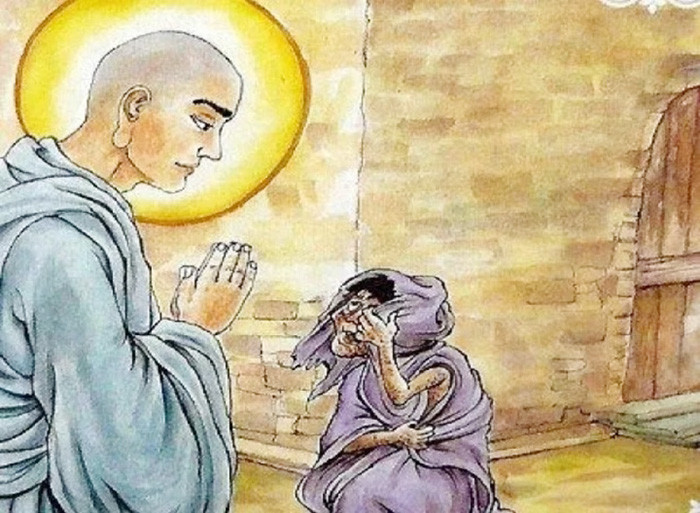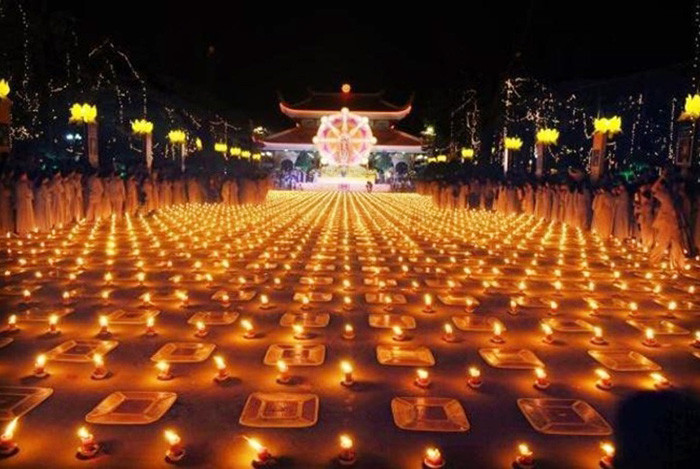The ancients believed that the ghost month was the time when ghosts and spirits were allowed to return to the mortal world and could harass or bring bad luck to people.
Ghost month is a familiar concept in Vietnamese folklore, referring to a period of time that has important meaning in the spiritual life and customs of Vietnamese people.
What is Ghost Month and the origin of Ghost Month?
The seventh month of the lunar calendar is called "ghost month" by many people. This concept has been passed down through many generations and there are many theories surrounding it. So what is ghost month? What is the origin of ghost month?
Many people believe that the concept of the ghost month originated from Taoism, with the belief that from the 2nd day of the 7th lunar month, the King of Hell begins to open the gates of hell to allow hungry ghosts to return to the human world. According to this belief of the Chinese, the gates of hell will close at midnight on the 14th of July. During that nearly half-month, people often offer porridge, rice, etc. so that hungry ghosts do not cause trouble, families are safe, and business does not encounter problems.
In Vietnam, worshiping wandering souls is a traditional spiritual belief that stems from the belief that humans have a body and a soul. After death, some people are reincarnated, some people have many emotional problems and are unable to be liberated, wandering aimlessly, and some people are exiled to hell as hungry ghosts, and if released, they can cause trouble in the human world.
Author Bui Xuan My wrote in the book Vietnamese Worship Customs: "According to traditional beliefs, on the 15th day of the 7th lunar month, sinners in the underworld are forgiven for one day, so families in the living world prepare offerings to their ancestors, burn votive paper, and pray for their blessings."
In the book Vietnamese Worship Customs published by the Culture and Information Publishing House, there is a passage: "The Mid-Autumn Festival is held on the 15th day of the seventh lunar month, also known as the Day of Pardon for the Dead. Many people set up offerings to all living beings in the yard, in front of their house, on the edge of the street, to worship wandering souls and hungry ghosts, using simple offerings such as rice paper, popcorn, corn, sweet potatoes, and boiled eggs."
During the ghost month, people believe that ghosts and demons will wander everywhere to cause trouble and bring disaster to people. Therefore, in addition to offerings and ceremonies at family temples, people also prepare offerings for the ghosts at bridges, shops, communal houses, and pagodas, which is called porridge offerings.
"Offerings for the porridge offering include porridge cooked with rice, small rice balls, fruits, cakes, popcorn, betel and areca nuts, sticky rice, sweet soup, and votive offerings. When the offering is finished, the wandering souls, the poor, and children compete for and share these items," author Bui Xuan My listed.
However, many experts assert that the origin of the ghost month is not necessarily Chinese. Other cultures such as India, Cambodia and Japan all share similar beliefs about the seventh lunar month, and these traditions may predate Buddhism. One folk legend says that King Yama (the ruler of hell) opened the gates of hell and allowed some ghosts to enjoy offerings on earth.

Ghost month has many spiritual meanings in culture.
YahooLife explains that the ghost month is a cultural combination of Taoism and Buddhism. In places with different beliefs, people also have different customs and ways of worship.
While Taoism's perspective focuses on appeasing wandering spirits, with Buddhist culture, people lean towards expressing filial piety and remembering their ancestors.
Therefore, in Vietnam, people often celebrate Vu Lan festival to show filial piety at the same time as the Xa sin vien (forgiving to the dead) festival, also known as the Thi thuc cho chung sinh (offering to sentient beings) festival on the 15th day of the 7th lunar month. However, people in the North often respect the Xa sin vien (forgiving to the dead) festival, while the Central and Southern regions emphasize Vu Lan festival to show filial piety to parents.
There are many explanations for the customs in the seventh lunar month. However, researchers all believe that these concepts contain noble humanistic meanings, promoting filial piety, doing good deeds, and living a good life.
Meaning of Ghost Month
In Vietnam, worshiping wandering souls is considered a traditional spiritual belief. Since ancient times, Vietnamese people have believed that humans have two parts: the soul and the body. Depending on the actions while alive, when they die, the soul will be reincarnated into another life or go to hell, or even wander around harassing ordinary people. The custom of worshiping wandering souls originated from this concept.
Folklore says that in the seventh lunar month, many hungry ghosts and abandoned souls wander around the earth. Therefore, families prepare rice, porridge, and salt to give to these souls as alms and also to bribe them so that they do not disturb their daily lives, as well as to give them a day of full meals and to ease their miserable fate.
These actions demonstrate humanity, especially with the concept of the day of forgiveness: Even if people commit crimes, they will be punished and receive retribution, but there will also be a day of forgiveness to reduce suffering and pain...

The seventh lunar month is also known as the ghost month.
In China, the offering to the wandering souls is made on the 14th day of the 7th lunar month. In Vietnam, this period lasts for more than ten days, not necessarily on the full moon day. The date of the offering to the wandering souls may depend on each family and each region.
The ghost month also coincides with the time of Vu Lan ceremony in Buddhism, so in addition to worshiping the deceased, Vietnamese people also have the culture of offering tea to the living such as parents and grandparents to show respect and remember the merit of giving birth.
At this time of year, major Buddhist centers across the country often hold mass prayers for the deceased and tea offerings for parents. These ceremonies attract more and more Buddhists, with a large number of young people participating.
According to VTC News